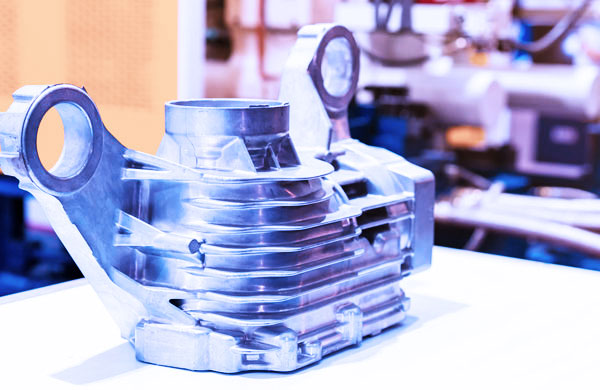The Best Strategy To Use For Stahl Specialty Company
The Best Strategy To Use For Stahl Specialty Company
Blog Article
Unknown Facts About Stahl Specialty Company
Table of ContentsLittle Known Facts About Stahl Specialty Company.The Ultimate Guide To Stahl Specialty CompanyThe Buzz on Stahl Specialty CompanyStahl Specialty Company for BeginnersThe Single Strategy To Use For Stahl Specialty Company
Chemical Contrast of Cast Light weight aluminum Alloys Silicon advertises castability by minimizing the alloy's melting temperature level and enhancing fluidity during spreading. Furthermore, silicon adds to the alloy's stamina and put on resistance, making it useful in applications where longevity is essential, such as automotive parts and engine components.It likewise enhances the machinability of the alloy, making it less complicated to process right into completed items. This way, iron adds to the general workability of light weight aluminum alloys. Copper enhances electric conductivity, making it advantageous in electric applications. It likewise improves rust resistance and contributes to the alloy's general stamina.
Manganese adds to the strength of light weight aluminum alloys and improves workability. It is commonly utilized in wrought light weight aluminum products like sheets, extrusions, and profiles. The existence of manganese aids in the alloy's formability and resistance to splitting during construction procedures. Magnesium is a light-weight component that offers stamina and impact resistance to aluminum alloys.
It permits the production of lightweight elements with superb mechanical residential or commercial properties. Zinc boosts the castability of light weight aluminum alloys and assists manage the solidification process throughout casting. It boosts the alloy's strength and hardness. It is often found in applications where complex forms and great details are essential, such as ornamental spreadings and specific auto components.
The Basic Principles Of Stahl Specialty Company
Because aluminum-silicon alloys have excellent spreading homes, high gas residential or commercial properties, simple procedures, and superb deterioration resistance, aluminum-silicon alloys are most frequently used in the die-casting sector in the house and abroad. At the exact same time, aluminum-silicon alloys are also fairly very early and widely acknowledged alloys developed and utilized in die-casting. After continuous study and enhancement, a lot of the present international mainstream aluminum-silicon alloys have actually been wrapped up and are nothing even more than A356, A360, A380, ADC12, B390, and A413.
The primary thermal conductivity, tensile stamina, return toughness, and prolongation vary. Among the above alloys, A356 has the highest thermal conductivity, and A380 and ADC12 have the most affordable.

The Only Guide for Stahl Specialty Company
In accuracy spreading, 6063 is fit for applications where intricate geometries and top notch surface finishes browse around here are critical. Instances consist of telecommunication units, where the alloy's premium formability allows for streamlined and visually pleasing designs while preserving structural honesty. In the Lights Solutions market, precision-cast 6063 components develop elegant and effective lights fixtures that require detailed shapes and excellent thermal efficiency.
(https://stahlspecialc.wordpress.com/2024/12/14/exploring-the-craft-of-aluminum-casting-inside-a-leading-foundry/)
The A360 displays remarkable elongation, making it ideal for complex and thin-walled elements. In precision spreading applications, A360 is well-suited for markets such as Customer Electronics, Telecommunication, and Power Devices.

In accuracy casting, aluminum 413 radiates in the Consumer Electronics and Power Tools sectors. It's frequently used to craft detailed components like smart device housings, cam bodies, and power tool housings. Its accuracy is remarkable, with limited tolerances up to 0.01 mm, guaranteeing perfect item assembly. This alloy's remarkable rust resistance makes it an exceptional choice for outdoor applications, making certain durable, long lasting products in the stated markets.
Rumored Buzz on Stahl Specialty Company
Once you have actually decided that the aluminum die casting process is appropriate for your task, a critical following action is selecting one of the most ideal alloy. The aluminum alloy you select will substantially influence both the casting procedure and the residential or commercial properties of the end product. As a result of this, you must make your choice meticulously and take an informed strategy.
Figuring out one of the most ideal light weight aluminum alloy for your application will certainly mean weighing a large variety of characteristics. These comparative alloy characteristics adhere to the North American Die Spreading Association's standards, and we have actually separated them into two classifications. Aluminum Casting. The initial category addresses alloy features that impact the production procedure. The 2nd covers characteristics influencing the buildings of the final item.
The alloy you choose for die casting straight affects numerous aspects of the spreading procedure, like how simple the alloy is to function with and if it is vulnerable to casting issues. Hot fracturing, likewise referred to as solidification cracking, is a common die spreading defect for aluminum alloys that can result in interior or surface-level tears or splits.
Getting The Stahl Specialty Company To Work
Certain light weight aluminum alloys are much more susceptible to hot splitting than others, and your option should consider this. One more common defect located in the die casting of aluminum is die soldering, which is when the actors stays with the die walls and makes ejection tough. It can harm both the actors and the die, so you need to search for alloys with high anti-soldering properties.
Deterioration resistance, which is currently a notable feature of light weight aluminum, can differ significantly from alloy to alloy and is an important particular to think about depending on the ecological conditions your item will be exposed to. Put on resistance is another residential or commercial property typically looked for in light weight aluminum products and can differentiate some alloys.
Report this page